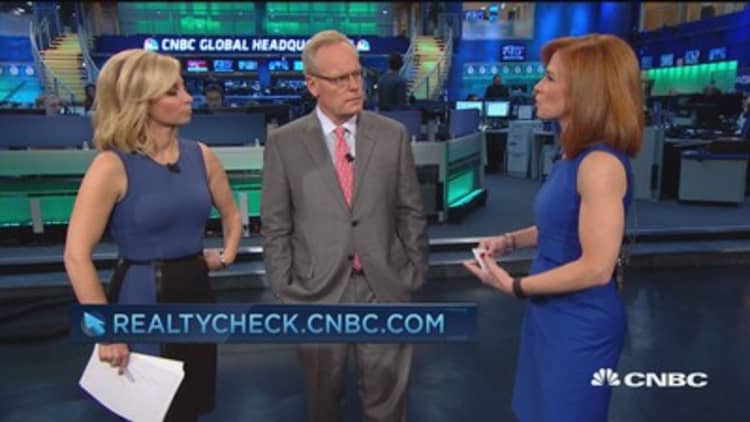Another move higher in U.S. mortgage interest rates pushed weekly applications down. Total volume fell 1.5 percent week-to-week on a seasonally adjusted basis for the week ending May 15th, according to the Mortgage Bankers Association (MBA).
While higher rates usually affect rate-sensitive refinances, the drop in loan applications to purchase a home was surprisingly large, down 4 percent from the previous week to the lowest level since April, though still 11 percent higher than the same week one year ago. This in the heart of the spring housing market.
Read MoreUS housing starts, building permits surge
"The drop this week may indicate borrowers being wary of the recent run up in mortgage rates," said Mike Fratantoni, MBA's chief economist.

The average contract interest rate for 30-year fixed-rate mortgages with conforming loan balances ($417,000 or less) increased to 4.04 percent, its highest level since December 2014, from 4.00 percent, with points decreasing to 0.32 from 0.36 (including the origination fee) for 80 percent loan-to-value ratio (LTV) loans.
Applications to refinance, which have been falling steadily amid higher rates, were basically flat, up 0.3 percent for the week. Government refinances drove volume higher.
The drop in mortgage purchase applications, however, may have as much to do with higher home prices and anemic inventory as it does with rates. Cash buyers are also making up a very large share of the market at 38 percent, as cash puts buyers in a better position in a bidding war. Higher interest rates just exacerbate an already competitive market.
Read MoreStudent debt doesn't keep new grads from mortgages: Study
"We're likely to continue to see these mortgage rate swings as market participants try to anticipate Fed timing around rising short term interest rates," said Len Kiefer, deputy chief economist at Freddie Mac. "Unfortunately, prospective homebuyers may experience bouts of affordability shock in many housing markets. So far it's been low mortgage rates that have helped to keep homebuyer affordability strong in the face of rising house prices, while income growth remains stagnant."
Housing starts did take a nice jump in April, up 17 percent month to month for single family homes, according to the U.S. Census. The pace, however, is still well below historical norms, and especially low given pent-up demand. Newly built homes are also pricier, as builders focus on the higher end buyers. The average loan size for newly built homes increased from $314,394 in March to $315,670 in April, its highest level in the history of the survey, according to the MBA.


